by Allen Reynolds, UrbanFaith Editor | Jan 19, 2022 | Commentary, Headline News |
(RNS) — On the day of a major voting rights debate on Capitol Hill, a social justice coordinator for the Progressive National Baptist Convention said fighting for voting rights is an effort to conquer evil.
“This convention practices a ministry of erosion,” said the Rev. Willie D. Francois III, co-chair of its social justice arm, during a Tuesday (Jan. 18) news conference held in Atlanta and livestreamed on the denomination’s social media.
“What does that mean? We keep showing up so that we wear evil down. The denial of voting rights is evil. The protection of Senate rules over the protection of the public is evil.”
The news conference was held at the historically Black denomination’s midwinter board meeting, just as legislators on Capitol Hill debated voting rights bills that the PNBC, along with a number of other faith organizations, support. However, the bills are not expected to pass.
Francois said the PNBC would be working with Faiths United to Save Democracy, a new coalition that has urged the Senate to change its rule about the filibuster, a stalling technique that requires 60 votes to end it and which is often used by the minority party to stop a bill from passing with a simple majority vote.
“The filibuster that was used to block anti-lynching laws cannot be used right now to block voter expansion,” Francois said. “And so we’re calling on our Senate to reform its filibuster to ensure that we can actually pass the John Lewis Voting Rights Act and we can also pass the Freedom to Vote Act.”
Regardless of what happens during the current debate, the PNBC leaders said they intend to move ahead with plans to lobby members of Congress in March and register voters weekly in their congregations and communities, aiming to increase voter rolls by 500,000.
The Rev. Adolphus Lacey, a pastor in New York’s Brooklyn borough, said these efforts will continue despite the ongoing coronavirus pandemic.
“COVID is real; COVID is a threat,” said Lacey, a PNBC social justice commissioner. “But even more serious than COVID, as real and scary as it is, is to see thousands and thousands of thousands of voters not being able to vote, and it was on our watch. We refuse to stop. We refuse to turn around.”
The denomination’s voter registration initiative will be aimed particularly at millennials and members of Gen Z.
But it will also focus on states with key races expected to have close margins, said the Rev. Darryl Gray of St. Louis.
“We don’t want to just register a half a million people,” said Gray, a PNBC pastor who served in the Kansas Senate in the 1980s and ran an unsuccessful 2020 campaign for Missouri state representative. “We want to register a half a million people in United States senatorial campaigns that are going to be consequential.”
PNBC leaders noted they belong to the denominational home of the Rev. Martin Luther King Jr., in a state at the center of voting rights debates. King co-pastored Ebenezer Baptist Church in Atlanta and his Southern Christian Leadership Conference, which was influential in the civil rights movement, also is based in the city.
“We believe it is no coincidence that this convention, born out of the need to fight for justice, is in this state and city at such a time as this when our voting rights are under fierce attack,” said the Rev. David R. Peoples, president of the PNBC.
“This is a call to action from the Progressive National Baptist Convention. We come to not just pray. We come to not just push. We come to not just preserve. We’ve come to protect the right to vote.”
READ THIS STORY AT RELIGIONNEWS.COM

by Samuel L. Perry, RNS | Jan 6, 2022 | Commentary, Headline News, Social Justice |
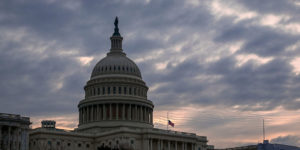 (RNS) — One year ago at the Capitol riot on Jan. 6, 2021, the world witnessed one way in which Christian nationalism imperils American democracy. We’ve all seen photos and footage of the mob violence perpetrated by Americans waving Christian flags, clad in Christian clothing, saying Christian prayers. As some increasingly isolated and radicalized religious conservatives react to their loss of power, the threat of their political violence is real. But it is not the only way Christian nationalism jeopardizes our democracy.
(RNS) — One year ago at the Capitol riot on Jan. 6, 2021, the world witnessed one way in which Christian nationalism imperils American democracy. We’ve all seen photos and footage of the mob violence perpetrated by Americans waving Christian flags, clad in Christian clothing, saying Christian prayers. As some increasingly isolated and radicalized religious conservatives react to their loss of power, the threat of their political violence is real. But it is not the only way Christian nationalism jeopardizes our democracy.
The fact is, Christian nationalist ideology — particularly when it is held by white Americans — is fundamentally anti-democratic because its goal isn’t “government of the people, by the people, and for the people.” Its goal is power. Specifically, power for “true Americans like us,” Christians in an almost ethnic sense, those who belong — the worthy. Stemming from this, the most salient threat white Christian nationalism poses to democracy is that it seeks to undermine the very foundation of democracy itself: voting.
We can see this connection long before the 2020 presidential election or recent efforts to restrict voter access throughout the country. As historian Anthea Butler recounts, at a 1980 conference Paul Weyrich, co-founder of the Moral Majority, spoke about electoral strategy to Christian right leaders including Tim LaHaye, Phyllis Schlafly, Pat Robertson, Jerry Falwell Sr. and then-presidential candidate Ronald Reagan.
Weyrich famously explained:
“Many of our Christians have what I call the goo-goo syndrome. Good government. They want everybody to vote. I don’t want everybody to vote. Elections are not won by a majority of people. They never have been from the beginning of our country and they are not now. As a matter of fact our leverage in the elections quite candidly goes up as the voting populace goes down.”
In Weyrich’s own words, the goal of these Christian right leaders wasn’t more Americans exercising their democratic rights. The goal is “leverage” and, with it, victory. Over the next few decades, Weyrich and other organizations he co-founded, like the American Legislative Exchange Council, tirelessly promoted legislation to restrict voter access, guided by the belief that voting must be controlled, lest the wrong sorts of people determine the outcome.
In a recent study I conducted with co-authors Andrew Whitehead and Josh Grubbs, we documented this same strong connection between Christian nationalist ideology and wanting to limit voter access. We surveyed Americans just before the November 2020 elections and thus before Donald Trump’s “Big Lie” began to dominate the narrative on the right. We use a scale to measure Christian nationalism that includes questions about the extent to which Americans think the government should declare the U.S. a Christian nation, that America’s success is part of God’s plan and other such views.
Even after we accounted for political partisanship, ideological conservatism and a host of other religious and sociodemographic characteristics, Christian nationalist ideology was the leading predictor that Americans felt we already make it “too easy to vote.”
You may ask, “Who exactly is voting too easily?” The obvious answer is the bogeyman trope of fraudulent voters — those pets, dead people and undocumented immigrants Trump warned about in spring 2020. This myth of widespread voter fraud is decades old and has been thoroughly debunked numerous times. Yet, unsurprisingly, we also found that Christian nationalism is the leading predictor that Americans believe “voter fraud in presidential elections is getting rampant these days.” And it bears repeating: Americans who affirm Christian nationalism already felt this way before the 2020 presidential election.
But other evidence suggests Christian nationalism doesn’t just hope to exclude fraudulent voters. For adults who believe America should be a “Christian nation,” their understanding of who should vote is even more narrow. For example, we asked Americans whether they would support a policy requiring persons to pass a basic civics test in order to vote or a law that would disenfranchise certain criminal offenders for life. These questions hark back to arbitrary Jim Crow restrictions white Southerners used before the Voting Rights Act of 1965. Once again, Christian nationalism is the leading predictor that Americans would prefer both restrictions.
But why?
Part of the reason for this is, as Weyrich explained in 1980, electoral leverage. Americans who subscribe to Christian nationalism likely assume persons excluded by civics tests and lifetime felon disenfranchisement (younger Americans and ex-convicts who are disproportionately Black) would be political threats, not allies.
Yet another reason also involves how white Christian nationalists view voting in general. In data we collected in August 2021, we asked Americans to indicate whether they felt voting was a right or a privilege. Though constitutional language repeatedly states voting is a right for citizens, Americans still debate the issue. As I show in Figure 1, the more Americans embrace Christian nationalism, the more likely they are to view voting as a privilege (something that can be extended or taken away) rather than a right (something that shall not be infringed). Indeed, at the extreme end of Christian nationalism, the majority hold this view.
Other evidence beyond voter access suggests Christian nationalism inclines Americans to favor institutional arrangements that preserve their political power. In the same October 2020 survey we used for the earlier study, we found that the more white Americans affirmed Christian nationalist ideology, the more likely they were to reject the popular vote as a means of selecting the president, to favor the Electoral College and to disagree that gerrymandering needed to be addressed to ensure fairer congressional elections (see Figure 2). Why? Almost certainly because these arrangements currently give white, rural, conservative Americans an electoral advantage even when they are numerical minorities. Again, the goal is power, not fairness or democracy.
As scholars of right-wing political movements point out, democracy is gradually eroded under some ideological covering, one that stokes populist anxiety with menacing tropes about cultural decline and justifies anti-democratic tactics to “save” or “restore” the nation — to make the nation great again. In the United States, white Christian nationalism is that ideological covering. In the minds of white Americans who believe America should be for “Christians like us,” increasing ethnic and religious diversity is a threat that must be defeated for God to “shed his grace on thee.”
Moreover, Americans who subscribe to Christian nationalism already thought voter fraud was rampant before November 2020. Today, in the aftermath of Trump’s “Big Lie” about a stolen election, which is still believed by over 80% of the most ardent believers in Christian nationalism, electoral integrity is viewed as hopelessly compromised. Thus, they see restricting voter access to those who prove worthy, and maintaining institutional advantages provided by the Electoral College and gerrymandering, as necessary strategies for preserving power and preventing what they see as their own imminent persecution under a Democratic administration.
The threat of Christian nationalist violence like what we saw on Jan. 6 is real. Yet because such threats are so obvious and shocking, and the role of Christian nationalism in them is so blatant, they make gaslighting about them more challenging. (Though Republican leaders are certainly trying, just the same.) In contrast, the threat of Christian nationalism as an ideological covering for voter suppression is perhaps more destructive because its influence is more subtle and its effects (electoral outcomes) are more consequential. Demagogues like Trump will no longer need to mobilize Christian nationalist violence after an electoral loss once they’ve ensured they’ll never lose in the first place.
(Samuel L. Perry is an associate professor of sociology at the University of Oklahoma. He is the author of two books on Christian nationalism, including the award-winning “Taking America Back for God: Christian Nationalism in the United States” (with Andrew L. Whitehead) and the forthcoming “The Flag and the Cross: White Christian Nationalism and the Threat to American Democracy” (with Philip Gorski). The views expressed in this commentary do not necessarily reflect those of Religion News Service.)
Ahead of the Trend is a collaborative effort between Religion News Service and the Association of Religion Data Archives made possible through the support of the John Templeton Foundation. See other Ahead of the Trend articles here.
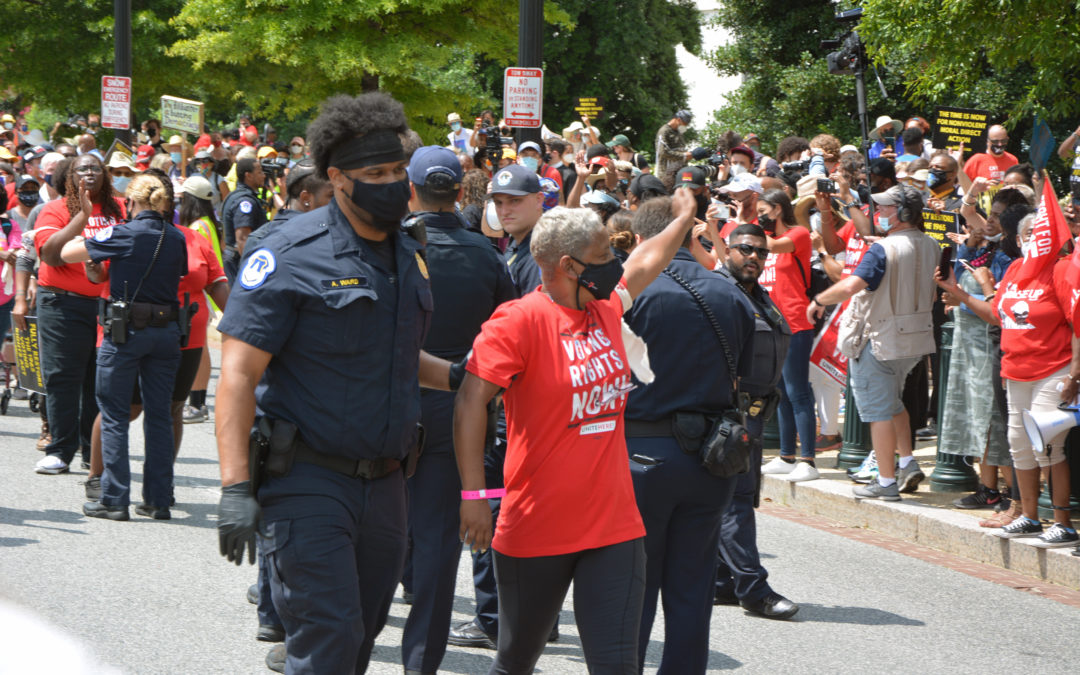
by Jack Jenkins, RNS | Aug 3, 2021 | Headline News, Social Justice |
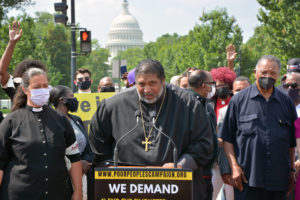
The Rev. William Barber, center, flanked by the Rev. Liz Theoharis, left, and the Rev. Jesse Jackson, right, speaks during a Poor People’s Campaign demonstration in Washington, Monday, Aug. 2, 2021. RNS photo by Jack Jenkins
WASHINGTON (RNS) — As police escorted a demonstrator in a wheelchair away from the chanting throng descending on the Capitol Monday (Aug. 2), fellow protesters turned to watch the person go. The group paused for a moment, then altered their call.
They screamed in unison: “Thank you! We love you!”
The lone protester nodded, fist raised. The crowd erupted in applause.
It was a moment that played out again and again over the course of the afternoon. According to Capitol police, more than 200 faith-led demonstrators were arrested while praying, singing and protesting in the street, hoping to draw attention to voting rights and a slate of other issues participants argued impact the poor and low-wage workers.
The sprawling demonstration was organized by the Poor People’s Campaign, an advocacy group led by the Rev. William Barber II and the Rev. Liz Theoharis that tends to support left-leaning policies. Monday’s action on the Hill constituted one of the largest mass-arrest nonviolent protests at the Capitol in recent memory and attracted an array of prominent voices, including civil rights icon the Rev. Jesse Jackson and Luci Baines Johnson, the daughter of late President Lyndon B. Johnson.
At a rally near the Capitol immediately before the march, leaders laid out what they insisted were interconnected issues driving their protest, which centered on voting rights, immigration reform, a $15 an hour federal minimum wage and eliminating the Senate filibuster that has stymied passage of related federal legislation.
“Filibuster is a sin!” Barber declared. “Making essential workers work during a pandemic — and risk their lives to save this country — and then not give them a living wage is sin.”
The event also featured music. Singers led the crowd in belting: “Somebody’s hurting my brother, and it’s gone on far too long. And we won’t be silent anymore!” The singers changed the lyrics as the song progressed, inserting lines such as “Somebody’s stealing our wages!” and “Somebody’s blocking our voting rights!”
The song echoes the sweeping, evolving agenda articulated by a variety of faith leaders across the country in recent months, particularly those who operate within religious communities of color.
The Poor People’s Campaign took a leading role in propelling that agenda this summer in the wake of Republican-led efforts to pass state-level elections bills many activists decry as restrictive. Indeed, Monday’s march follows what organizers called a “season” of similar demonstrations organized by the PPC over the past two months in Washington, Arizona and most recently Texas, where activists mimicked the 1965 civil rights march from Selma to Montgomery, Alabama. The group walked 27 miles from Georgetown to Austin, Texas, in late July to oppose voting restrictions.
Texas pastor the Rev. Frederick Haynes III, who joined the Texas march and has vigorously opposed state elections bills, was among the speakers at the Washington rally.
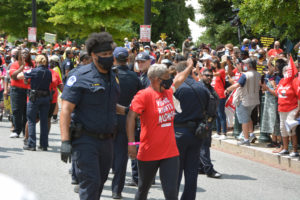
Activists are arrested during a Poor People’s Campaign demonstration in Washington, Monday, Aug. 2, 2021. RNS photo by Jack Jenkins
“President Biden, Democrats and Republicans, the culture will put it like this: If you come for us and we didn’t send for you, you don’t want this smoke,” said the Progressive National Baptist, whose denominational convention is happening this week. “You don’t want this smoke because we are fighting for the soul of this nation.”
The activists’ efforts have hit roadblocks with some Democrats at the national level, particularly Sen. Joe Manchin of West Virginia and Krysten Sinema of Arizona. Both opposed efforts to pass minimum wage increases and eliminate the filibuster this year — in Manchin’s case, despite a meeting with Barber and low-wage workers. The Poor People’s Campaign has since targeted bothlawmakers with protests.
Barber was quick to harangue members of both parties during the rally, accusing some Democrats of heaping praise on late civil rights icon Rep. John Lewis but failing to support his vision for voting rights.
“Some Democrats told us: ‘If y’all organize, don’t connect wages to voting rights,'” Barber said. “I’m too old to play that.”
He added: “The same people suppressing the votes suppress your wages, won’t fix your utility grids, suppress your health care, cut public education, block living wages — you’ve got to make the connection.”
Barber also offered his own adaptation of the Scripture passage from Isaiah 10:1-3:
“Woe unto you hypocrites who pay attention to all of Robert’s Rules (of order), all the made up rules of the Senate and the House, but you filibuster justice. And filibuster mercy. And you filibuster faithfully.”
Barber was briefly joined at the rally by Sen. Raphael Warnock, himself a prominent Georgia pastor. However, Barber explained Warnock would not speak because the campaign generally does not let politicians address their protests. Warnock is a champion of the For the People Act, a federal voting rights legislation Barber and others praised but Manchin opposed.
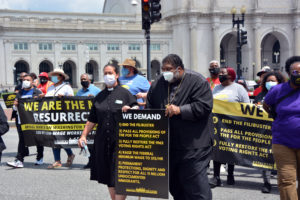
The Rev. Rev. Liz Theoharis, center left, and the Rev. William Barber lead a Poor People’s Campaign demonstration march in Washington, Monday, Aug. 2, 2021. RNS photo by Jack Jenkins
Among the clergy milling about the crowd — which also included many red-shirted members of the labor union Unite Here! — were the Rev. Patrick Messer, a United Church of Christ pastor who just left a church in Nebraska, and the Rev. Deana Oliva, a Unitarian Universalist minister from Kentucky.
Asked what spurred them to be part of the protest, Oliva was aghast at the thought of not participating — “Where else would we be?” — and Messer pointed to Jesus.
“I’m here because in Jesus’ first sermon he said the spirit is upon me to bring good news to the poor, and to bring deliverance to the captive,” Messer said. “We’re here to bring a $15 minimum wage to all workers, restore the Voting Rights Act of 1965 and pass all the provisions of the For the People Act and end the filibuster.”
The daughter of President Lyndon B. Johnson — who signed the Voting Rights Act into law — also addressed the crowd at the event. Luci Baines Johnson noted she could not speak for her father, but insisted he would have wanted her to be with activists “in the fight for social justice and voting rights.” After voicing support for the For the People Act and the John Lewis Act, another voting rights bill, she invoked Scripture while calling for bipartisanship.
“In the 1960s, Democrats and Republicans stood up together for social justice,” she said. “It was the right thing then, and it’s the right thing now. Now more than ever before, we need to — in the words of Isaiah — come and reason together to get a more just America for everybody.”
The Rev. Jesse Jackson also addressed the crowd, bemoaning what he called a nation “in crisis” and voicing a willingness to go to jail for the cause.
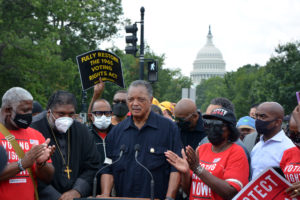
The Rev. Jesse Jackson, center, speaks during a Poor People’s Campaign demonstration in Washington, Monday, Aug. 2, 2021. RNS photo by Jack Jenkins
He led the group in a call-and-response chant: “I am! Somebody! I may be poor! But I am! Somebody! I may be unemployed! But I am! Somebody! I may not have health care! But I am! Somebody! Respect me! Protect me! Elect me! I am! God’s child!”
Others who delivered either speeches or prayers at the event included prominent Muslim American activist Linda Sarsour, National Council of Churches President Jim Winkler, Simple Way founder Shane Claiborne, activist and former chairman of the San Carlos Apache Tribe Wendsler Nosie and several low-wage workers or people impacted by poverty.
After the speeches, the activists massed into a column and marched toward the Capitol, with clergy walking alongside low-wage workers and those impacted by poverty. Tensions briefly flared with police when they insisted demonstrators stay on the sidewalk for one stretch of their march. Protesters initially refused, walking past police before a wave of new officers arrived and corralled the group off the street.
Demonstrators took to the street a short time later after processing past the Supreme Court toward the Hart Senate building. One column of protesters stayed on the sidewalk, but a separate group — including Barber, Theoharis, Jackson and what appeared to be Messer and Oliva — positioned themselves in the middle of the road, refusing to move. Some briefly requested entry to the Hart building at Barber’s urging, but police rebuffed them, and they returned to the street.
As demonstrators sang and chanted (“What do we want? Voting rights! When do we want them? Now!”), officers began arresting those in the road one by one, carefully leading them away. Cheers rose up as Theoharis, Barber and Jackson were arrested, and they were followed by hundreds more: clergy of multiple faiths, low-wage workers, young activists and elderly people in walkers or wheelchairs were all among those arrested.
When each one arrived at the area where other arrestees were waiting to be processed, shouts and applause rang out.
It remains to be seen how lawmakers will react to the growing protest movement. Sen. Sherrod Brown of Ohio was spotted walking quickly past the protest. When demonstrators shouted for the end of the filibuster, he quickly replied, “I agree with you,” a reference to his public willingness to end the filibuster if Republicans continue to use it to block liberal legislation.
The mixture of religious and labor demonstrators appeared to be clear in their cause on Monday and dedicated to convincing Congress to support it. They sang many songs, but one favorite seemed to be aimed directly at lawmakers: It simply asked, over and over, “Which side are you on?”


 (RNS) — One year ago at the Capitol riot on Jan. 6, 2021, the world witnessed one way in which Christian nationalism imperils American democracy. We’ve all seen photos and footage of the mob violence perpetrated by Americans waving Christian flags, clad in Christian clothing, saying Christian prayers. As some increasingly isolated and radicalized religious conservatives react to their loss of power, the threat of their political violence is real. But it is not the only way Christian nationalism jeopardizes our democracy.
(RNS) — One year ago at the Capitol riot on Jan. 6, 2021, the world witnessed one way in which Christian nationalism imperils American democracy. We’ve all seen photos and footage of the mob violence perpetrated by Americans waving Christian flags, clad in Christian clothing, saying Christian prayers. As some increasingly isolated and radicalized religious conservatives react to their loss of power, the threat of their political violence is real. But it is not the only way Christian nationalism jeopardizes our democracy.



